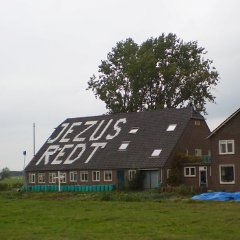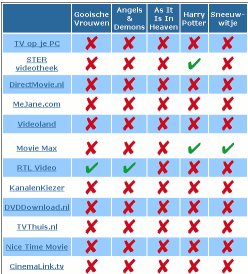 The Council of State decided last Wednesday that farmer Joop van Ooijen must remove the text “Jezus redt” (Jesus saves) from his roof or else he’ll be fined 15,000 euro.
The Council of State decided last Wednesday that farmer Joop van Ooijen must remove the text “Jezus redt” (Jesus saves) from his roof or else he’ll be fined 15,000 euro.
The welstandscommissie of the municipality of Giessenlanden—a typically Dutch abomination that gets to rule on the beauty of any outdoors construction—had outlawed the Christian slogan before. The Council of State (1531) is the highest court of appeal for administrative decisions, and is formally presided by the non-elected Queen.
Van Ooijen told De Volkskrant he will appeal the decision. According to the council, an appeal is not possible.
Update: As Arnoud Engelfriet points out in the comments, the appeal will likely be at a European level.
See also:
(Public domain photo by Wikipedia user Apdency)

 Usenet community FTD has lost the lawsuit it had started pre-emptively against the Brein foundation to establish that its activities are legal.
Usenet community FTD has lost the lawsuit it had started pre-emptively against the Brein foundation to establish that its activities are legal.
 The Dutch Union of Criminals — I kid you not — has
The Dutch Union of Criminals — I kid you not — has  NVPI, an organisation representing the ‘Dutch’ entertainment industry*, recently called for harsher measures against legal copying in the Netherlands, pointing out that there is a ‘sufficient’ supply of stores offering really legal downloads**. However, as Internet lawyer Arnoud Engelfriet points out, they are stretching the truth a bit.
NVPI, an organisation representing the ‘Dutch’ entertainment industry*, recently called for harsher measures against legal copying in the Netherlands, pointing out that there is a ‘sufficient’ supply of stores offering really legal downloads**. However, as Internet lawyer Arnoud Engelfriet points out, they are stretching the truth a bit.  PR agencies and journalists alike have been screaming blue murder the past few days over the perceived consequences of
PR agencies and journalists alike have been screaming blue murder the past few days over the perceived consequences of  Collecting society Buma/Stemra is after Dutch bloggers now. Starting in 2010 you must cough up 130 euro for every six music videos you embed in your web page,
Collecting society Buma/Stemra is after Dutch bloggers now. Starting in 2010 you must cough up 130 euro for every six music videos you embed in your web page,  Several municipalities have not only refused to comply with a WOB request (Dutch freedom of information act), but are actively discussing with each other how to frustrate the process.
Several municipalities have not only refused to comply with a WOB request (Dutch freedom of information act), but are actively discussing with each other how to frustrate the process.  If you don’t know what a tell-a-friend system is: these are forms on a third-party’s web site that will let you notify a friend of something interesting on that site. So what if you want to tell a friend about a 24 Oranges posting? Our preferred way is the one depicted in
If you don’t know what a tell-a-friend system is: these are forms on a third-party’s web site that will let you notify a friend of something interesting on that site. So what if you want to tell a friend about a 24 Oranges posting? Our preferred way is the one depicted in